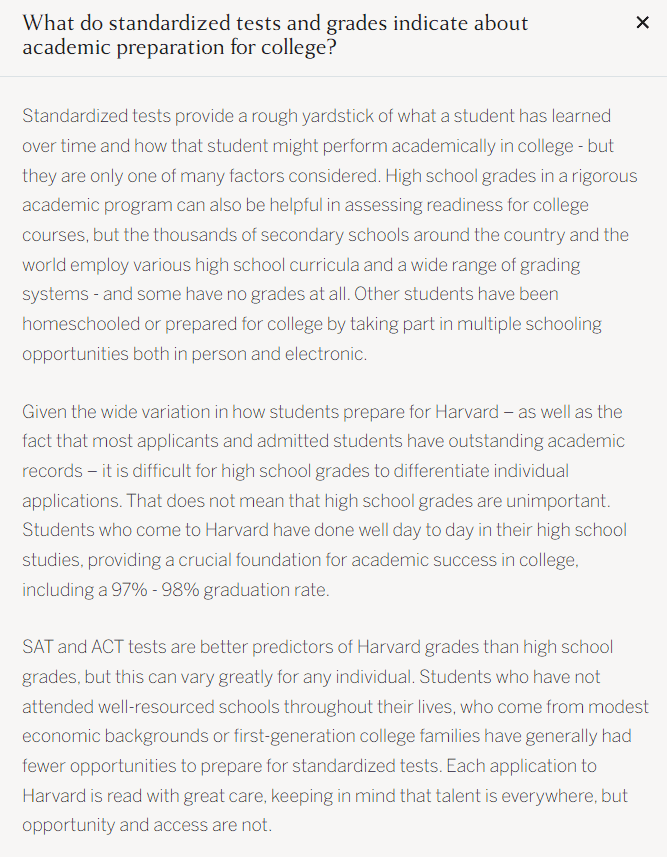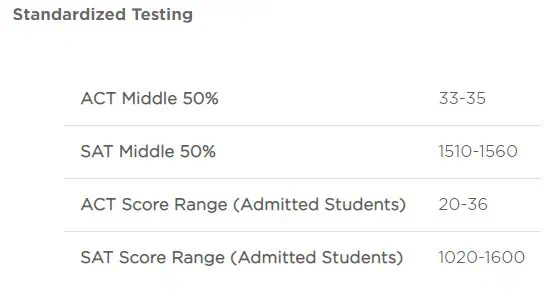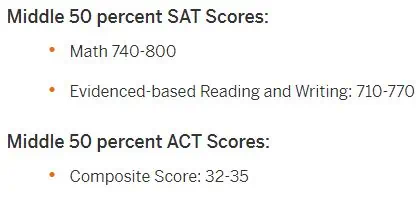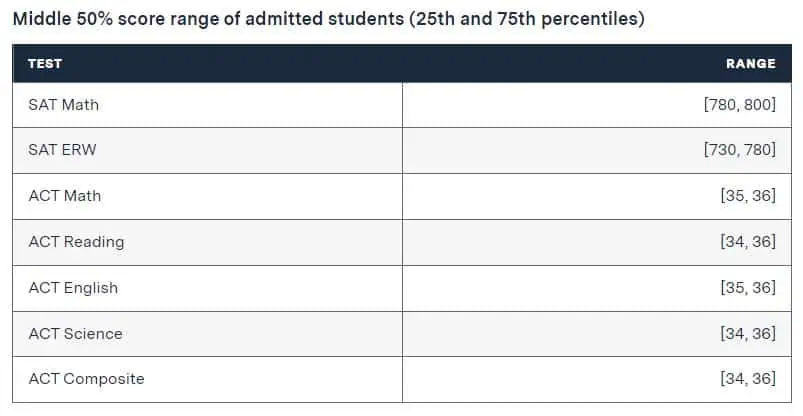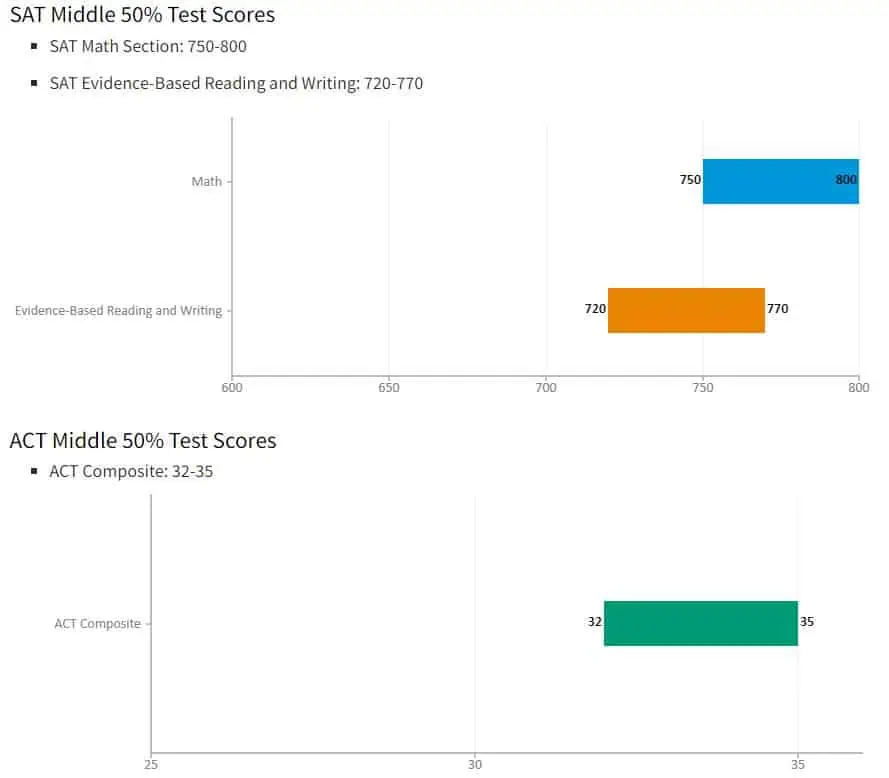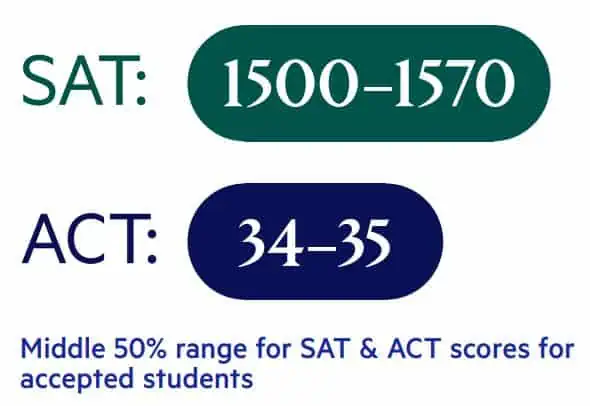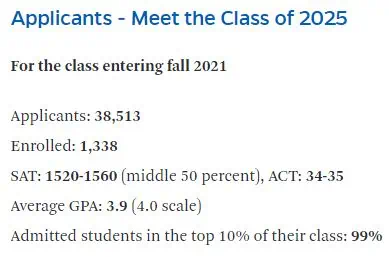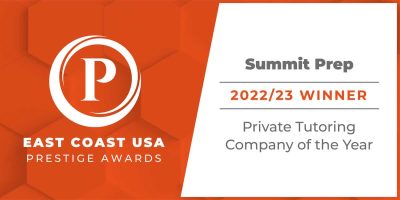At most colleges, students now have the option to submit or not submit SAT and ACT scores when applying. However, the relevant question is not “Can I apply without test scores?” The relevant question is: “Should I apply without test scores?” In every aspect of life, there is a wide gulf between what we can and probably should do. So what should most students do?
Who Should Apply Test Optional?
Harvard gives the clearest answer of any test-optional college that we have researched. Here is their answer:
Harvard’s answer is great because it tells us:
- Why SAT and ACT scores might be useful: Given the varied grading and curricula around the country and around the world, a common yardstick by which to measure academic preparedness is likely incredibly useful.
- That SAT and ACT scores actually are useful: While it makes sense that — theoretically — they would be useful, are they actually? Yes. They are the best predictors (even better than high school GPA) of success at Harvard.
- Why make test scores optional then: Some students have less opportunity and access, so those students’ test scores might not be the best predictors of their success at Harvard.
Exceptions
There are some additional applicants who have a decent chance of admission without test scores (though they will need a good GPA and their admission chances will still be improved when combined with test scores above the college’s average): full-pay students applying to a cash strapped college, a legacy applying early decision, family members of the college’s faculty, the children of large donors to the college, etc.
Here’s a good rule of thumb for test optional admissions: Before the college went test optional, would you likely have been admitted to the college if your SAT or ACT was below their middle 50% score range on account of some preferential admissions status (legacy, family member of faculty, athletic recruitment, etc)? If yes, then you can likely get admitted by applying without SAT or ACT scores. If no, then you very likely need to submit test scores that are at or above the bottom of the college’s middle 50% score range in order to have a decent shot at admission. (For example, if the middle 50% of a college’s class averages between a 30 and 34 on the ACT, then a student will need a 30 or above in order for their test score to improve their admission chances to that school.) In short, unless a college is test blind (meaning they wouldn’t look at your score even if you sent it), then they are selectively test optional — i.e. really only test optional for some students.
Why Do Colleges Want Test Scores?
Grades have become increasingly poor predictors of success in college.
In 2019, over two-thirds of students attending a 4-year bachelor’s program at a university had an A+, A, or A- average when they were in high school. That’s not even just students at selective universities but at any university. Here’s an example of just how inflated students’ high school GPAs are: in 2019, 70% of admitted students to UCLA (a highly selective but not even one of the most selective universities) had an unweighted high school GPA of 3.94 or above (out of 4.0). Only 4% had a B+ average or below.¹
It is not possible to stand out in admissions with even a near-perfect high school GPA, especially not to a highly selective college. In such a competitive admissions climate, students are looking for just about any edge. High school GPA — while still incredibly important — is not it.
Looking for an Edge
That edge has to be some combination of other factors to really help a student’s chances of admission to a selective college: an SAT or ACT score above the college’s average, 4’s or preferably 5’s on multiple AP exams, athletic recruitment, exceptional essays and outstanding teacher recommendations, etc. Even if someone tells you they were admitted to a selective college without an SAT or ACT score, you might then want to ask if they submitted any AP exams to the college. They probably did.
Colleges don’t care how they get it, but they want a standardized measure by which to compare applicants, whether that’s an SAT/ACT score or AP exams (and colleges prefer as much information as possible). In fact, the average student at Harvard took 8 AP exams.² Eight. So even a student who was admitted “without test scores” probably still submitted numerous AP scores. Why would colleges care about AP exam scores? Because they want to know what percentile a student is scoring in. For example, if a student scores a 5 on the AP Literature exam, that puts them in the top 4.9% of test-takers.³ That’s incredible, especially considering the caliber of the other students taking that AP exam. A student with a 5 on this exam is very likely in the top 1% of all students in their language proficiency. So, while Harvard still wants you to submit SAT/ACT scores, they wouldn’t care as much if they don’t have your SAT Verbal score if they have your AP Literature and AP Language exam scores or if they don’t have your SAT Math score if they have your AP Calculus BC and AP Physics 1/2 exam scores. But, if you want to gain admission to a selective college (and you don’t have an admissions status that gives you preference over other applicants), then you’re very likely going to need to show at least one standardized score for the college to feel confident that your academic preparedness falls in the percentile of students that they’re looking to admit.
Conclusion
We all want life to be easy. But we also know that often what makes life hard is what allows us to get ahead. By working harder at our sprints, we get faster than the competition. By applying ourselves more than others at work, we get the promotion. When we do the hard work that others will not, that’s when we gain an advantage. Competition for admissions is no different: your hard work will pay off and take away barriers to greater success.

Bonus content
Test Optional Policies of Top Colleges
Want to hear what the top colleges themselves say about if they want to see test scores? Even when they say that they are test optional, their stated preferences tend to reveal that they prefer tests. And, most of their websites display their SAT and ACT scores: clearly these colleges care about these scores because they advertise them so prominently. Take a look:
Harvard University
See their testing preference above: SAT and ACT scores better predict success at Harvard than any other measure. Interestingly, however, Harvard is one of the few top schools that does not emphasize the scores of its class or admitted students, but you can still find that information in some of their publications.
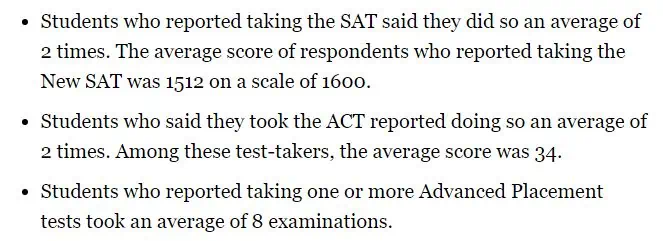
University of Chicago
“These tests can provide valuable information about a student…” (UChicago admissions website).
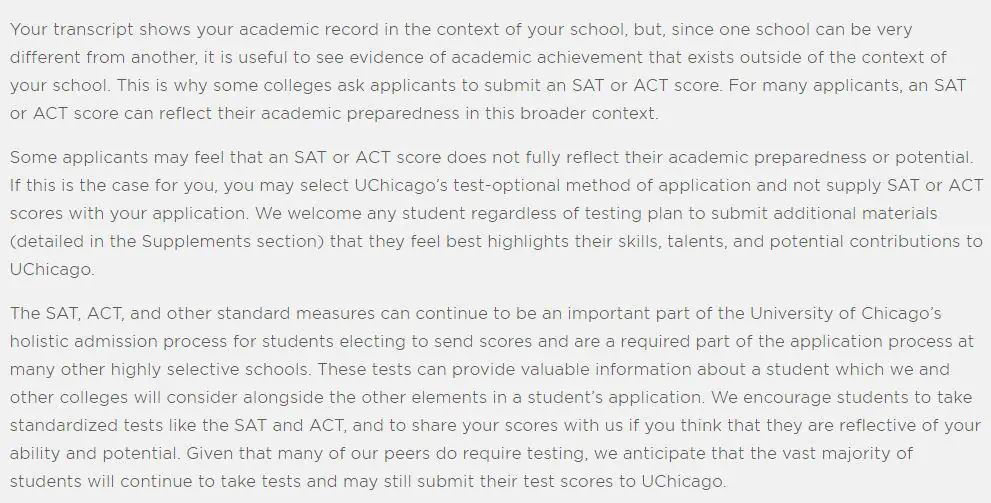
Princeton University
“For those who submit testing, …we encourage the submission of all test scores. If you sat for an AP or IB test, we recommend you self-report all of your AP or IB scores…” (Princeton University Admissions Website)
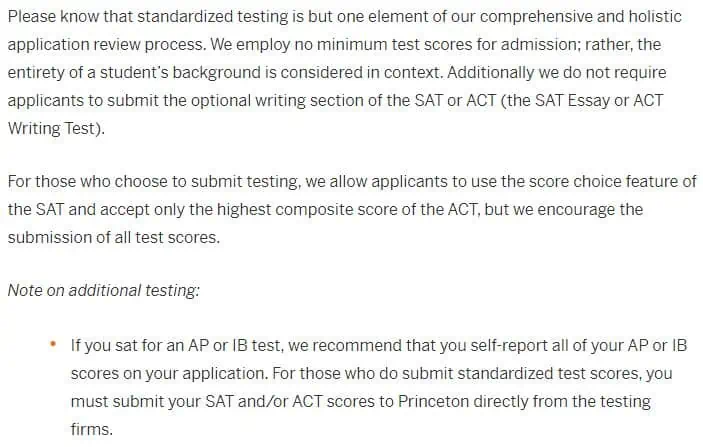
Columbia University
“… testing is just one factor in our holistic review process.” (Columbia University Admissions Website) And they would like to see AP scores.
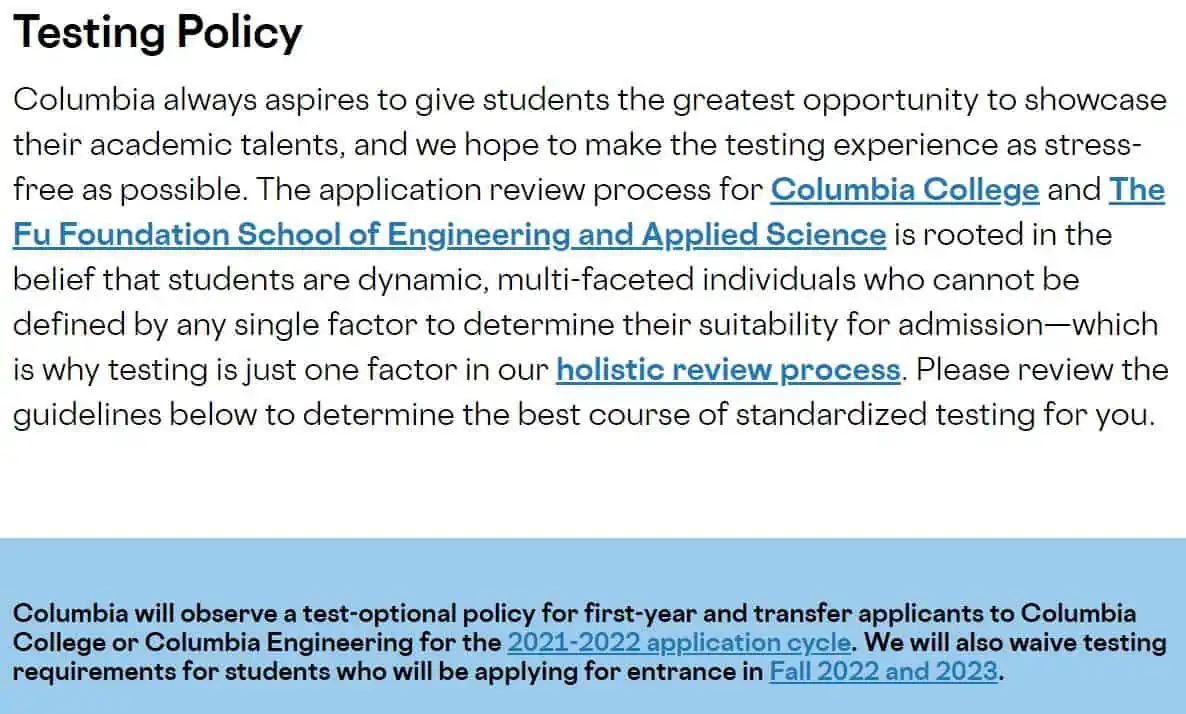
Massachusetts Institute of Technology
“[Test scores] help us more accurately evaluate [an applicant’s] preparedness for MIT… [and] our research shows that considering performance on the SAT/ACT substantially improves our ability to predict subsequent student success at MIT.” (MIT Admissions Website) They have my favorite admission website actually because they give so much data (check it out here) on the scores of their admitted students, which helps students make better decisions.

Yale University
“Applicants who have successfully completed one or more ACT or SAT exams should consider including scores, even if those scores are below the middle 50% ranges listed below. Yale’s internal research has consistently shown that ACT and SAT scores are a significant predictor of a student’s undergraduate academic performance.” (Yale Admissions Website)
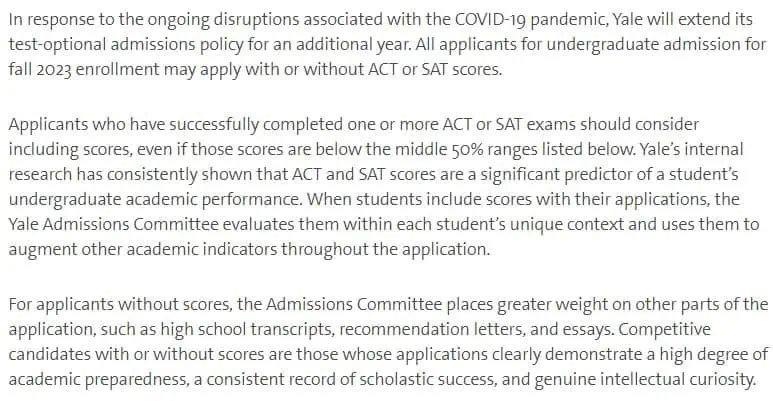
Stanford
On its website, Stanford basically just says that SAT and ACT scores are optional and little else (Stanford Admissions Website). If this was the only school I looked at, I would probably think that they actually don’t care very much about scores, but… given that all of their peer institutions care enough to even say that they care, I think it’s overwhelmingly likely that Stanford heavily prefers test scores as well. Before I would believe the contrary, they would have to release admissions data that proved that students with high test scores don’t have a significant advantage in the admissions process relative to equally qualified students who do not submit test scores. And I think they would release that data if they had it. In the meantime, they still like to advertise the high test scores of their students…
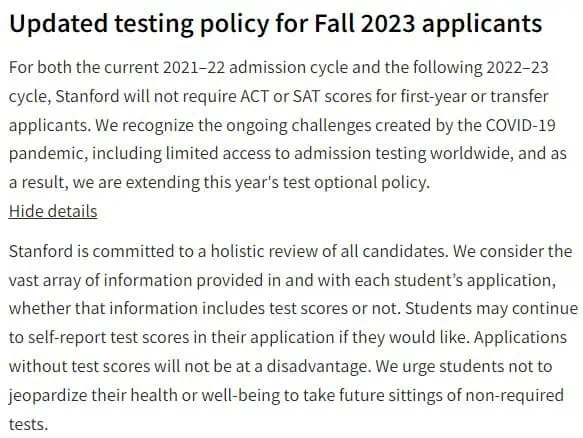
University of Pennsylvania
“As part of our comprehensive admissions process, we use standardized testing to gain more insight into the academic preparation of our applicants.” (UPenn Admissions Website). Perhaps timid to recommend testing themselves, they do point to the Ivy League athletic website for advice to athletes on submitting test scores. That website says: “Like all applicants, prospective student-athletes are encouraged, but not required, to submit the results of any standardized tests they have taken to date.” (Ivy League Athletics Website)
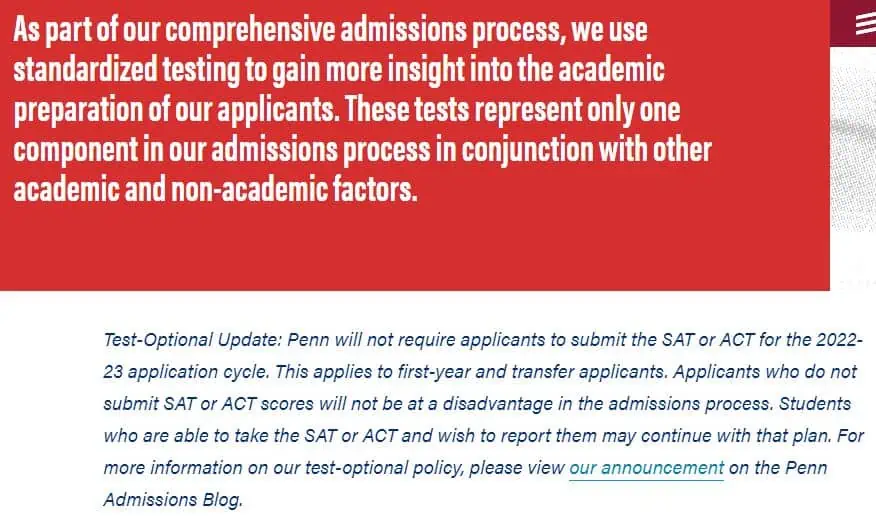
California Institute of Technology
Three-year moratorium on using test scores. (Caltech Admissions Website) They don’t prominently list the scores of their graduating classes, so kudos to them on that consistency at least that they say they are test optional and then they don’t emphasize test scores (though if they were more confident in their test optional policy, one would expect them to continue it indefinitely and not extend it one year at a time).
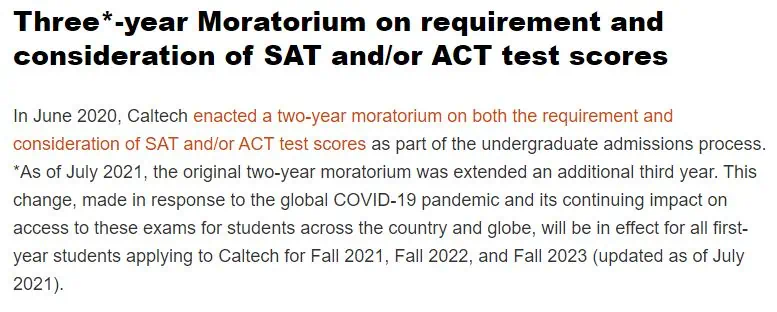
Duke University
Recommends taking the SAT or ACT — and preparing for them. (Duke Admissions Website) They also explicitly say that they value AP and IB exam scores.


Johns Hopkins University
They sound test optional. And I would believe it except that the data and public acknowledgments from peer institutions (together with common sense) suggest otherwise… And when describing their own class, the class’s test scores were the third characteristic of the class mentioned. Kind of showing your hand there, Johns Hopkins…

Northwestern University
“While high schools grades are a strong predictor of academic success in college, the combination of grades and standardized test scores has been shown to strengthen that prediction… [and] we still find value in scores if you choose to send them.” (Northwestern Admissions Website)
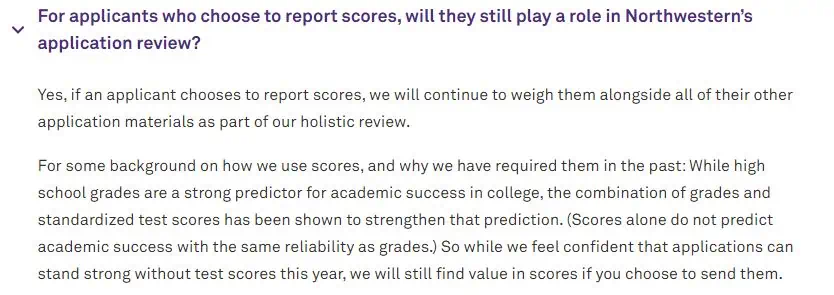
More bonus content.
If you’d like to see an in-depth analysis of a college’s test optional policy, you can find one here. In short, even when a college says that they are “truly test optional,” they almost definitely still truly prefer test scores.
Works Cited:



